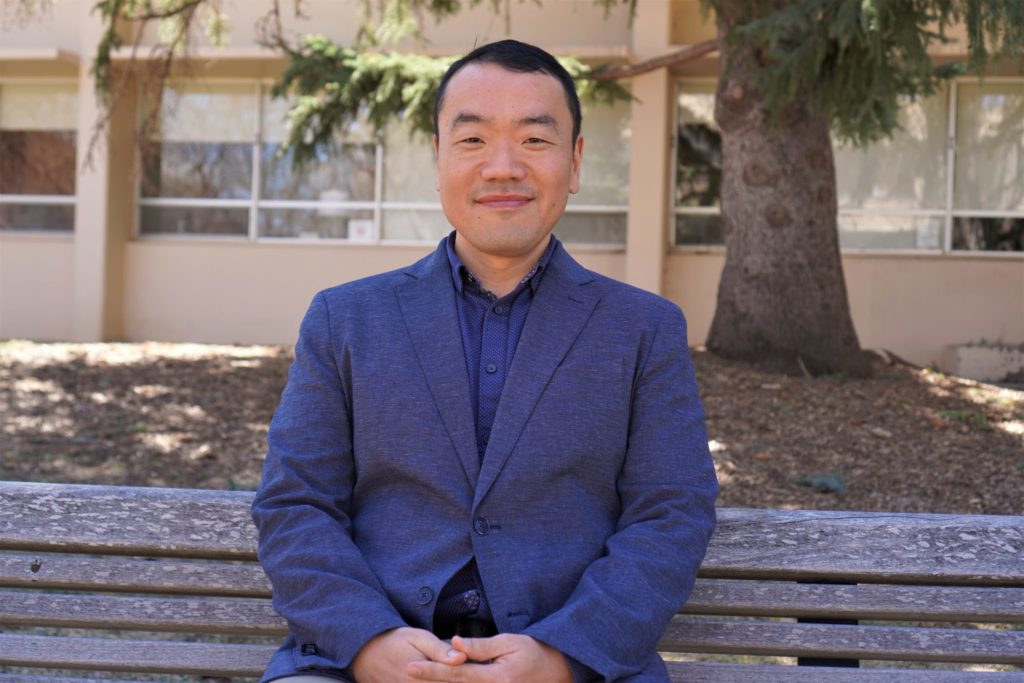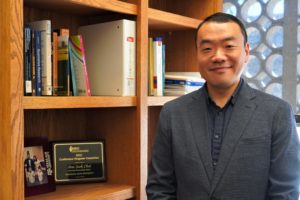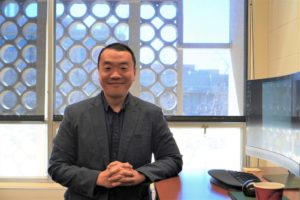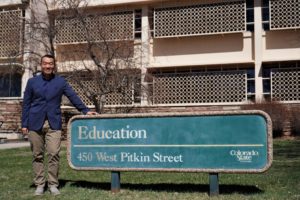
Educated in South Korea, Georgia, Minnesota, and Texas, DaeSeok Chai, Ph.D., has already blazed a ten-thousand-mile trail through the field of human resource development. Chai is currently extending his impact into the Centennial State, serving as an assistant professor in the School of Education at Colorado State University.
Chai is a scholar in the field of Human Resource Development, where he studies how to develop people, teams, and organizations in international and cross-cultural contexts, including how higher education institutions can support international students. Now Chai has been recognized with the Early Career Scholar Award by the Academy of Human Resource Development for his prominence in the field at this early stage in his career.
Korean and U.S. influence
When Chai first came to the U.S. from South Korea, he wasn’t even aware that the HRD field existed. He arrived in 2003, as an international undergraduate student at the University of Georgia, majoring in career and technical education. He knew he wanted to teach students and help them develop their interests, but it wasn’t until he had nearly obtained his degree that he found his calling in HRD.
“During my senior year, I learned about the field of human resource development and became fascinated with its positive influence on people in various organizational contexts,” said Chai.

Chai credits his interactions with international and U.S. students for his interest in student behavior and the catalyst for his journey into HRD.
“This was the first time I met and interacted with students from diverse backgrounds,” he said. “As a result, I became very curious about why some American students behave more collectively and hierarchically than Koreans and why international students behave, think, and interpret situations differently.”
After obtaining his undergraduate degree from the University of Georgia, Chai went on to pursue his master’s degree at the University of Minnesota, where he studied HRD, with adults from a variety of backgrounds. It was during this time that Chai had a revelation: he could no longer define the U.S. culture as homogenous, as he once had.
After a hiatus from his studies, where Chai worked as a global HRD professional for a Korean conglomerate, he returned to the U.S. and began his Ph.D. at Texas A&M University. Here, Chai realized that not only is the U.S. culture not homogenous, but each state in the U.S. has its own unique culture.
“My academic, corporate, and consulting experience in both the U.S. and Korea led to my deep interest in culture and HRD,” Chai said.
Scope of research
Chai’s extensive scope of research can be broken down into three main areas: expatriation effectiveness, leadership in diverse cultural contexts, and HRD in an international context.
Because of Chai’s expertise in quantitative and qualitative research methods, he’s been invited to work with many international scholars and students. He has led several interdisciplinary teams of researchers on a variety of topics, and his collaborations have produced dozens of published works, including journal articles and book chapters.
In the field of HRD, funding is rarely available, but Chai has secured grant and contract funding from universities and other institutions to support his research.
“My studies have been recognized for their methodological rigor and have been cited 327 times,” said Chai. “These works also led to invitations to share the findings and implications at multiple institutions in the U.S., Korea, and Japan.”

Expatriation effectiveness
Chai became interested in the cultural adjustment and developmental demands of those who leave their native country to live somewhere else. At Texas A&M University, Chai created a research design, formed a team, and mentored three international doctoral students on how to use structural equation modeling to investigate and improve the cultural experience of international students in the U.S.
“The findings inform universities about the critical resources international students need for successful academic achievement and social integration,” said Chai. “This study also offered several practical insights to help universities make data-driven decisions about how to strategically prioritize resources to assist international students. This study also established a new framework that can be used to guide future studies with underrepresented university student populations.”
His research with expatriation effectiveness has been funded by several U.S. universities, including CSU. He also works closely with the Office of International Programs at CSU to examine resources and demands having to do with international students’ experiences around the world.
Leadership in diverse cultural contexts
Chai’s research has looked at leadership in non-western cultural contexts. One study collected examples of effective and ineffective leadership styles as regarded by employees of Korean conglomerates through a culture-specific lens. These examples were then used to suggest seven general indigenous themes of Korean leadership. To complete this study, Chai led a research team from several universities in the U.S. and the United Kingdom.
“As the first indigenous Korean leadership study, the findings provided new insights and a deeper understanding of what behaviorally distinguishes effective and ineffective leaders in the Korean private sector,” Chai said.
The next two studies were born out of these findings and demonstrated comparisons to the original study. The first was a cross cultural study with the same international research team, which looked at similarities and differences in perceived leadership effectiveness in the United Kingdom and Korea. The study found considerable convergence of the preferred leadership behaviors in both countries.
“Considering the significance of culturally embedded leadership practices, I plan to develop a Korean leadership model and an instrument to measure leadership effectiveness in the Korean cultural context,” said Chai.
For the second comparative study, Chai formed a research team to explore how organizational support affects organizational commitment, and the moderation effect of paternalistic leadership in an East Asian cultural context based on Confucianism. This study received the Cutting-Edge award from the AHRD in 2019.
HRD in an international context

Fitting well into Chai’s interest in culture and its impact on human development, his third research strand focuses on theoretical frameworks and constructs that were first developed for the West and then were adapted for non-western contexts. With this focus in mind, Chai has collaboratively produced multiple studies in many different cultural contexts, including Lebanon, Korea, Vietnam, and the U.S.
At CSU, Chai collaboratively developed an interdisciplinary team with the School of the Biomedical Engineering to develop a cultural competency course for undergraduate STEM students. To address the need for cultural competence, this interdisciplinary research team developed and submitted an NSF proposal to design a global exposure course implementing innovative learning activities and assignments.
Successful outcomes of this course serve as a model for undergraduate students in other engineering and non-engineering departments to (a) improve their cultural competence readiness, (b) connect science to practice, and (c) better prepare students for the future workforce. Currently, the team has secured seed grant money from the College of Health and Human Sciences, the School of Education, and the College of Engineering and will conduct a pilot course to resubmit the NSF grant proposal based on the results from the pilot study.
Chai plans to continue seeking opportunities for research collaboration with students, colleagues, and organizations around the world, while extending his service to the School of Education and CSU.
“I hope my efforts help enrich CSU, professional organizations, society, and the world,” said Chai.
About the Early Scholar Career Award
The Early Career Scholar Award is given to an outstanding HRD scholar in the early stages of their career who has made identifiable and significant contributions in scholarly research to the field of HRD. The Academy of Human Resource Development is a global professional association of scholars and academics studying HRD.
“It is exhilarating for me to receive this award,” said Chai. “I really appreciate those who have introduced opportunities and encouraged and guided me to do all the research, teaching, and service work: my advisers, Drs. Jia Wang and Gary McLean, international academic friends, my school director Dr. Faircloth, and School of Education colleagues.”
While expressing gratitude for his peers who helped him achieve this award, Chai references the Isaac Newton quote found on CSU’s “Newton’s Corner” sculpture: “If I have seen further, it is by standing on the shoulders of giants.”
The School of Education is part of CSU’s College of Health and Human Sciences.